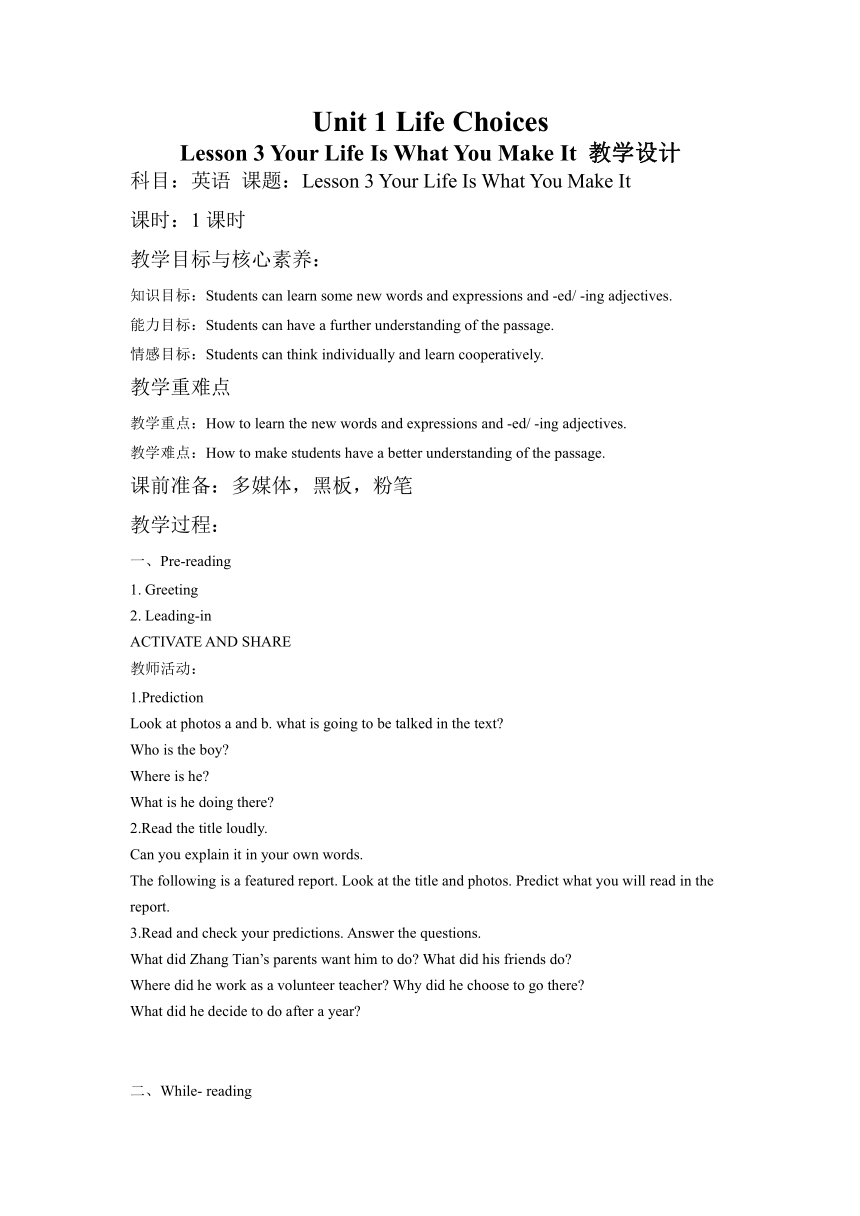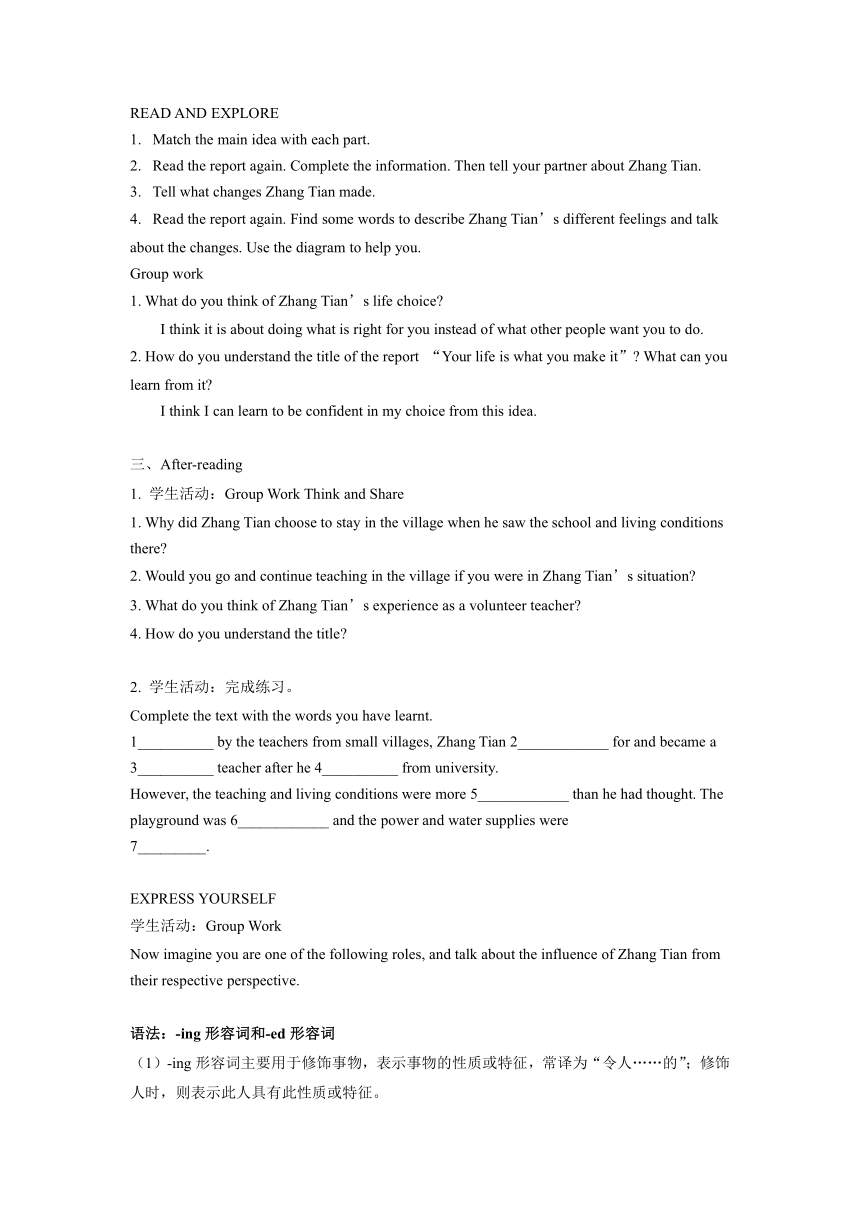北师大版(2019)必修 第一册Unit 1 Life Choices Lesson 3 Your Life Is What You Make It 教学设计-
文档属性
| 名称 | 北师大版(2019)必修 第一册Unit 1 Life Choices Lesson 3 Your Life Is What You Make It 教学设计- |

|
|
| 格式 | docx | ||
| 文件大小 | 22.2KB | ||
| 资源类型 | 教案 | ||
| 版本资源 | 北师大版(2019) | ||
| 科目 | 英语 | ||
| 更新时间 | 2025-02-06 00:00:00 | ||
图片预览


文档简介
Unit 1 Life Choices
Lesson 3 Your Life Is What You Make It 教学设计
科目:英语 课题:Lesson 3 Your Life Is What You Make It
课时:1课时
教学目标与核心素养:
知识目标:Students can learn some new words and expressions and -ed/ -ing adjectives.
能力目标:Students can have a further understanding of the passage.
情感目标:Students can think individually and learn cooperatively.
教学重难点
教学重点:How to learn the new words and expressions and -ed/ -ing adjectives.
教学难点:How to make students have a better understanding of the passage.
课前准备:多媒体,黑板,粉笔
教学过程:
一、Pre-reading
1. Greeting
2. Leading-in
ACTIVATE AND SHARE
教师活动:
1.Prediction
Look at photos a and b. what is going to be talked in the text
Who is the boy
Where is he
What is he doing there
2.Read the title loudly.
Can you explain it in your own words.
The following is a featured report. Look at the title and photos. Predict what you will read in the report.
3.Read and check your predictions. Answer the questions.
What did Zhang Tian’s parents want him to do What did his friends do
Where did he work as a volunteer teacher Why did he choose to go there
What did he decide to do after a year
二、While- reading
READ AND EXPLORE
Match the main idea with each part.
Read the report again. Complete the information. Then tell your partner about Zhang Tian.
Tell what changes Zhang Tian made.
Read the report again. Find some words to describe Zhang Tian’s different feelings and talk about the changes. Use the diagram to help you.
Group work
1. What do you think of Zhang Tian’s life choice
I think it is about doing what is right for you instead of what other people want you to do.
2. How do you understand the title of the report “Your life is what you make it” What can you learn from it
I think I can learn to be confident in my choice from this idea.
三、After-reading
1. 学生活动:Group Work Think and Share
1. Why did Zhang Tian choose to stay in the village when he saw the school and living conditions there
2. Would you go and continue teaching in the village if you were in Zhang Tian’s situation
3. What do you think of Zhang Tian’s experience as a volunteer teacher
4. How do you understand the title
2. 学生活动:完成练习。
Complete the text with the words you have learnt.
1__________ by the teachers from small villages, Zhang Tian 2____________ for and became a 3__________ teacher after he 4__________ from university.
However, the teaching and living conditions were more 5____________ than he had thought. The playground was 6____________ and the power and water supplies were
7_________.
EXPRESS YOURSELF
学生活动:Group Work
Now imagine you are one of the following roles, and talk about the influence of Zhang Tian from their respective perspective.
语法:-ing形容词和-ed形容词
(1)-ing形容词主要用于修饰事物,表示事物的性质或特征,常译为“令人……的”;修饰人时,则表示此人具有此性质或特征。
The music is really disturbing when I sleep.
当我睡觉时这个音乐太烦人了。
The story is very interesting.
这个故事很有趣。(故事本身有趣)
The man is very interesting.
这个人很有趣。(人本身或人的性格有趣)
(2)-ed形容词通常用于说明人的感受,常译为“感到……的”,强调人自身的情感波动;修饰事物时,则多修饰神态,感觉,容貌,表情,声音,情绪等显示某人情感状况的名词。
He had a pleased smile on his face.
他脸上露出了满意的微笑。
I became interested in playing football thanks to a small accident.
多亏一件小事,我对踢足球变得感兴趣了。
He told me the news in a very excited voice.
他用非常激动的声音告诉了我这个消息。
(3)常用-ing形容词和-ed形容词
-ing形容词 -ed形容词
amazing(令人惊奇的) amazed(感到惊奇的)
worrying(令人担心的) worried(感到担心的)
touching(令人感动的) touched(感动的)
frightening(吓人的) frightened(受惊吓的)
moving(令人感动的) moved(感动的)
exciting(令人兴奋的) excited(感到兴奋的)
pleasing(令人高兴的) pleased(感到高兴的)
satisfying(令人满意的) satisfied(感到满意的)
surprising(令人吃惊的) surprised(感到吃惊的)
amusing(好笑的) amused(觉得好笑的)
interesting(有趣的) interested(感兴趣的)
boring(无聊的,令人厌烦的) bored(感到厌烦的,感到无聊的)
disappointing(令人失望的) disappointed(感到失望的)
puzzling(令人迷惑的) puzzled(感到迷惑的)
encouraging(令人鼓舞的) encouraged(受鼓舞的)
exhausting(令人筋疲力尽的) exhausted(感到筋疲力尽的)
tiring(令人疲劳的) tired(感到疲劳的)
annoying(令人烦恼的) annoyed(烦恼的)
astonishing(令人惊奇的) astonished(感到惊奇的)
confusing(令人不解的) confused(迷惑不解的)
embarrassing(令人尴尬的) embarrassed(感到尴尬的)
inspiring(令人鼓舞的) inspired(受到鼓舞的)
shocking(令人震惊的) shocked(惊讶的)
terrifying(恐怖的) terrified(吓坏了的)
练习:
1. The ____________ (move) story we heard over the radio made us cry.
2. We were very ____________ when we heard the ____________ news. (shock)
3. The tiger looked very ____________, but Li Ping wasn't ____________. (frighten)
4. Look! The students ____________ (seat) at the back of the classroom are playing computer games.
5. Mr Smith, ____________ (tire) of the ____________ (bore) speech, started to read a novel.
(Answers:
1. moving 2. shocked; shocking 3. frightening; frightened 4. seated 5. tired; boring)
四、Summary
重点词汇:apply, independently, power, intend, be responsible for
重点句型:现在分词(短语)作状语;It作形式主语;主语从句
重点语法:-ing形容词和-ed形容词
五、Homework
Act out the talk show in front of the class.
Lesson 3 Your Life Is What You Make It 教学设计
科目:英语 课题:Lesson 3 Your Life Is What You Make It
课时:1课时
教学目标与核心素养:
知识目标:Students can learn some new words and expressions and -ed/ -ing adjectives.
能力目标:Students can have a further understanding of the passage.
情感目标:Students can think individually and learn cooperatively.
教学重难点
教学重点:How to learn the new words and expressions and -ed/ -ing adjectives.
教学难点:How to make students have a better understanding of the passage.
课前准备:多媒体,黑板,粉笔
教学过程:
一、Pre-reading
1. Greeting
2. Leading-in
ACTIVATE AND SHARE
教师活动:
1.Prediction
Look at photos a and b. what is going to be talked in the text
Who is the boy
Where is he
What is he doing there
2.Read the title loudly.
Can you explain it in your own words.
The following is a featured report. Look at the title and photos. Predict what you will read in the report.
3.Read and check your predictions. Answer the questions.
What did Zhang Tian’s parents want him to do What did his friends do
Where did he work as a volunteer teacher Why did he choose to go there
What did he decide to do after a year
二、While- reading
READ AND EXPLORE
Match the main idea with each part.
Read the report again. Complete the information. Then tell your partner about Zhang Tian.
Tell what changes Zhang Tian made.
Read the report again. Find some words to describe Zhang Tian’s different feelings and talk about the changes. Use the diagram to help you.
Group work
1. What do you think of Zhang Tian’s life choice
I think it is about doing what is right for you instead of what other people want you to do.
2. How do you understand the title of the report “Your life is what you make it” What can you learn from it
I think I can learn to be confident in my choice from this idea.
三、After-reading
1. 学生活动:Group Work Think and Share
1. Why did Zhang Tian choose to stay in the village when he saw the school and living conditions there
2. Would you go and continue teaching in the village if you were in Zhang Tian’s situation
3. What do you think of Zhang Tian’s experience as a volunteer teacher
4. How do you understand the title
2. 学生活动:完成练习。
Complete the text with the words you have learnt.
1__________ by the teachers from small villages, Zhang Tian 2____________ for and became a 3__________ teacher after he 4__________ from university.
However, the teaching and living conditions were more 5____________ than he had thought. The playground was 6____________ and the power and water supplies were
7_________.
EXPRESS YOURSELF
学生活动:Group Work
Now imagine you are one of the following roles, and talk about the influence of Zhang Tian from their respective perspective.
语法:-ing形容词和-ed形容词
(1)-ing形容词主要用于修饰事物,表示事物的性质或特征,常译为“令人……的”;修饰人时,则表示此人具有此性质或特征。
The music is really disturbing when I sleep.
当我睡觉时这个音乐太烦人了。
The story is very interesting.
这个故事很有趣。(故事本身有趣)
The man is very interesting.
这个人很有趣。(人本身或人的性格有趣)
(2)-ed形容词通常用于说明人的感受,常译为“感到……的”,强调人自身的情感波动;修饰事物时,则多修饰神态,感觉,容貌,表情,声音,情绪等显示某人情感状况的名词。
He had a pleased smile on his face.
他脸上露出了满意的微笑。
I became interested in playing football thanks to a small accident.
多亏一件小事,我对踢足球变得感兴趣了。
He told me the news in a very excited voice.
他用非常激动的声音告诉了我这个消息。
(3)常用-ing形容词和-ed形容词
-ing形容词 -ed形容词
amazing(令人惊奇的) amazed(感到惊奇的)
worrying(令人担心的) worried(感到担心的)
touching(令人感动的) touched(感动的)
frightening(吓人的) frightened(受惊吓的)
moving(令人感动的) moved(感动的)
exciting(令人兴奋的) excited(感到兴奋的)
pleasing(令人高兴的) pleased(感到高兴的)
satisfying(令人满意的) satisfied(感到满意的)
surprising(令人吃惊的) surprised(感到吃惊的)
amusing(好笑的) amused(觉得好笑的)
interesting(有趣的) interested(感兴趣的)
boring(无聊的,令人厌烦的) bored(感到厌烦的,感到无聊的)
disappointing(令人失望的) disappointed(感到失望的)
puzzling(令人迷惑的) puzzled(感到迷惑的)
encouraging(令人鼓舞的) encouraged(受鼓舞的)
exhausting(令人筋疲力尽的) exhausted(感到筋疲力尽的)
tiring(令人疲劳的) tired(感到疲劳的)
annoying(令人烦恼的) annoyed(烦恼的)
astonishing(令人惊奇的) astonished(感到惊奇的)
confusing(令人不解的) confused(迷惑不解的)
embarrassing(令人尴尬的) embarrassed(感到尴尬的)
inspiring(令人鼓舞的) inspired(受到鼓舞的)
shocking(令人震惊的) shocked(惊讶的)
terrifying(恐怖的) terrified(吓坏了的)
练习:
1. The ____________ (move) story we heard over the radio made us cry.
2. We were very ____________ when we heard the ____________ news. (shock)
3. The tiger looked very ____________, but Li Ping wasn't ____________. (frighten)
4. Look! The students ____________ (seat) at the back of the classroom are playing computer games.
5. Mr Smith, ____________ (tire) of the ____________ (bore) speech, started to read a novel.
(Answers:
1. moving 2. shocked; shocking 3. frightening; frightened 4. seated 5. tired; boring)
四、Summary
重点词汇:apply, independently, power, intend, be responsible for
重点句型:现在分词(短语)作状语;It作形式主语;主语从句
重点语法:-ing形容词和-ed形容词
五、Homework
Act out the talk show in front of the class.
同课章节目录
- Unit 1 Life Choices
- Lesson 1 Lifestyles
- Lesson 2 Understanding and Coping with Stress
- Lesson 3 Your Life Is What You Make It
- Unit 2 Sports and Fitness
- Lesson 1 The Underdog
- Lesson 2 Rules of the Game
- Lesson 3 Running and Fitness
- Unit 3 Celebrations
- Lesson 1 Spring Festival
- Lesson 2 Special Occasions
- Lesson 3 Memories of Christmas
